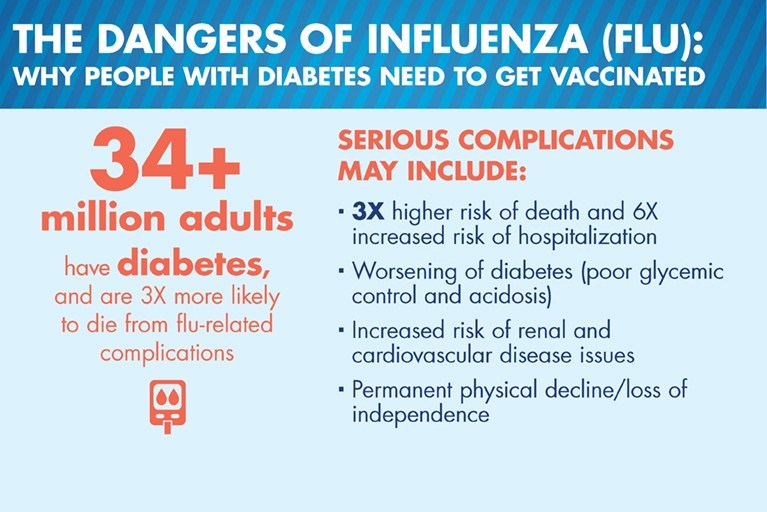

The National Foundation for Infectious Diseases (NFID) highlighted the importance of annual influenza (flu) vaccination as a critical component of diabetes management.
NFID issued a new Call to Action, The Dangers of Influenza and COVID-19 in Adults with Chronic Health Conditions, detailing the risks of co-infection with flu and COVID-19 in adults with diabetes and other chronic health conditions, and the importance of flu vaccination. The goals of the report have been supported by more than 35 leading medical organizations, including the Association of Diabetes Care & Education Specialists, who is now urging stakeholders to prioritize flu vaccination for these vulnerable populations.
Healthcare professionals who treat patients with diabetes know how important it is to advise them to take certain steps to stay healthy, including:
- Eating a balanced diet;
- Exercising;
- Monitoring and controling blood sugar levels; and
- Taking medication as prescribed.
It is equally important to emphasize the need for annual flu vaccination in protecting their health. According to the Centers for Disease Control and Prevention (CDC), diabetes—even if well managed—can make it harder for the immune system to fight respiratory infections such as flu or pneumonia, putting patients at greater risk for serious complications. Studies show that people with diabetes are three times more likely to die and six times more likely to be hospitalized due to flu-related complications, compared to people without diabetes.
Flu-Related Complications for People with Diabetes
For people with diabetes, serious flu-related complications may include:
- Worsening of diabetes (poor glycemic control and acidosis)
- Permanent physical decline and loss of independence
- Hospitalization or even death
Despite these risks, a recent NFID survey found that nearly one out of four US adults who are at greater risk for flu-related complications (including people with diabetes and other chronic health conditions) do not plan to get vaccinated this flu season. The survey also found that 46 percent of high-risk individuals were unfamiliar with pneumococcal disease, and more than half (51 percent) report that they have never been advised to get vaccinated against pneumococcal disease.
NFID recommends that healthcare professionals inform patients with diabetes about the dangers of flu and pneumococcal disease and insist that they get vaccinated:
- Send reminders during the fall to ensure that patients schedule a vaccination visit to help prevent flu and pneumococcal disease.
- If the practice does not offer vaccines, write a “prescription” for flu and pneumococcal vaccines to emphasize the urgency and importance of prevention.
3 Tools to Help #LowerYourFluRisk
NFID has developed resources to help share the importance of annual flu vaccination and lower the risks of flu for people with diabetes including:
- 30-second public service announcement (PSA) and short social media videos
- Infographics for healthcare professionals and patients about the importance of flu prevention for those with certain chronic health conditions including diabetes
- Sample social media posts and graphics
more recommended stories
 Dietary Melatonin Linked to Depression Risk: New Study
Dietary Melatonin Linked to Depression Risk: New StudyKey Summary Cross-sectional analysis of 8,320.
 Type 2 Diabetes Risk Identified by Blood Metabolites
Type 2 Diabetes Risk Identified by Blood MetabolitesKey Takeaways (Quick Summary) Researchers identified.
 Microglia Neuroinflammation in Binge Drinking
Microglia Neuroinflammation in Binge DrinkingKey Takeaways (Quick Summary for HCPs).
 Durvalumab in Small Cell Lung Cancer: Survival vs Cost
Durvalumab in Small Cell Lung Cancer: Survival vs CostKey Points at a Glance Durvalumab.
 Rising Chagas Parasite Detected in Borderland Kissing Bugs
Rising Chagas Parasite Detected in Borderland Kissing BugsKey Takeaways (At a Glance) Infection.
 Can Ketogenic Diets Help PCOS? Meta-Analysis Insights
Can Ketogenic Diets Help PCOS? Meta-Analysis InsightsKey Takeaways (Quick Summary) A Clinical.
 Ancient HHV-6 Genomes Confirm Iron Age Viral Integration
Ancient HHV-6 Genomes Confirm Iron Age Viral IntegrationKey Takeaways for HCPs Scientists reconstructed.
 Fat-Regulating Enzyme Offers New Target for Obesity
Fat-Regulating Enzyme Offers New Target for ObesityKey Highlights (Quick Summary) Researchers identified.
 Gestational Diabetes Risk Identified by Blood Metabolites
Gestational Diabetes Risk Identified by Blood MetabolitesKey Takeaways (Quick Summary for Clinicians).
 Pelvic Floor Disorders: Treatable Yet Often Ignored
Pelvic Floor Disorders: Treatable Yet Often IgnoredKey Takeaways (Quick Summary) Pelvic floor.

Leave a Comment